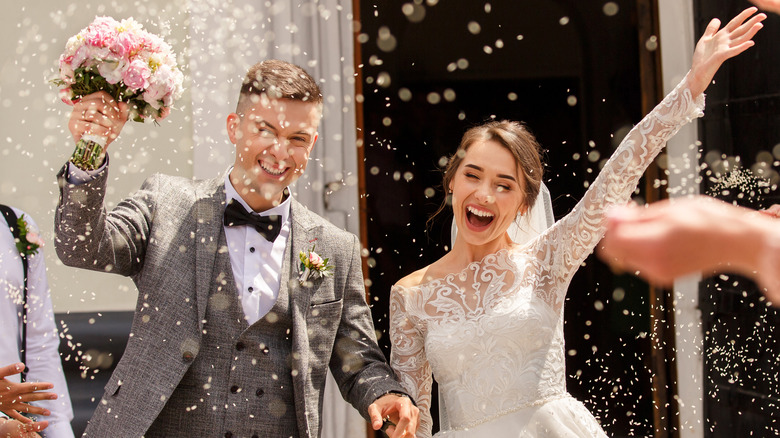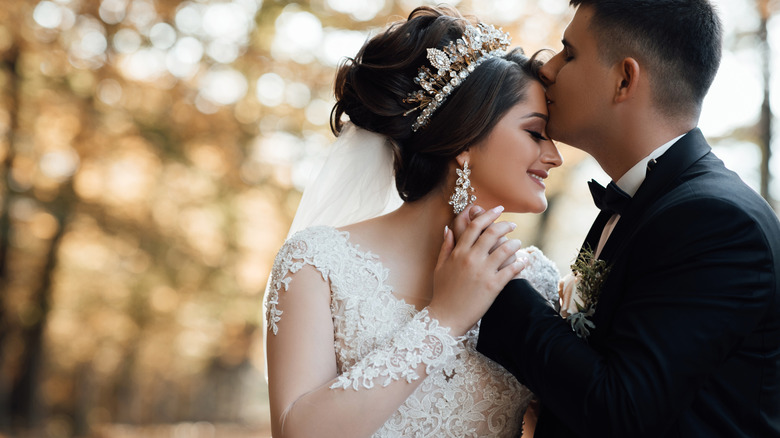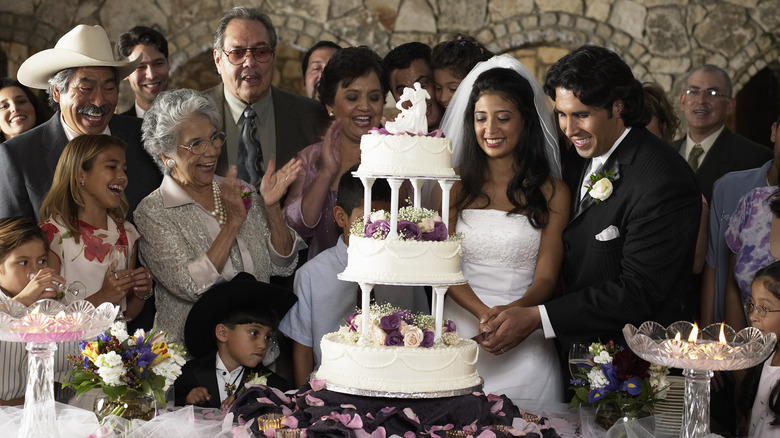Science Says This Is The Best Age To Get Married
Many people daydream of having their perfect wedding. It is common to imagine one's partner, his or her personality and looks, and the joy and excitement that will come from walking down the aisle. Relatively few people imagine themselves and their partner being a particular age, but maybe they should start. Research suggests that a person's age when they marry can have an impact on the quality of their marriage.
It is generally not the best idea to get married right out of high school or even college. Kelsey Torgerson, a licensed clinical social worker, tells Brides that people should generally wait until they are at least 25 to get married. Before age 25 the brain is not fully developed, so a person may not yet be totally sure what he or she wants in a partner. Waiting until at least 25 may also give a young couple time to experience challenges together that will shed light on whether they are compatible during both the good times and the bad.
Weena Cullins, a therapist specializing in premarital and relationship counseling, told Brides that in her clinical experience, 28-year-old brides are more prepared for a healthy marriage due to their confidence, self-awareness, and life experience. On the other hand, she says that it is best for men to marry at age 32, when they have matured and settled into a career. Anecdotal experience is all well and good, but what does the data say?
Research suggests that the ideal age of marriage is 28 or older
Our experts' claims have been confirmed: compared to people who marry at a younger age, people who marry above the age of 25 are 50% less likely to divorce within five years. According to research conducted by Nicholas H. Wolfinger at the Institute for Family Studies, divorce rates are lowest for people who first get married at around 30-34 years of age.
But what about people who first get married at 35 or older? Wolfinger hypothesizes that some of these people may have struggled to find a partner due to interpersonal difficulties, and may be more likely to divorce for that same reason. He also suggests that maybe "people who marry later face a pool of potential spouses that has been winnowed down to exclude the individuals most predisposed to succeed at matrimony."
Not all experts agree with this, though. Phillip Cohen, sociologist at the University of Maryland, presents a model that suggests women are least likely to get divorced if they first marry between ages 45 and 49 (an age group excluded by Wolfinger's analysis), and that the most important predictor of divorce may be level of education, with college graduates having lower divorce rates.
Perhaps April Davis, founder of LUMA Luxury Matchmaking, said it best when speaking to Brides: "The best time to get married is when you feel comfortable and confident in your job and personal life. If you were to give yourself an exact age, you might find that you settle for whomever you're with at that age."
The role of family values in marital timing
Also, the value placed on marriage varies across cultures. In light of this, researchers have examined how certain factors influence at what age individuals in non-Western cultures feel it is best to get married. One factor experts have examined is the role of parental attitudes towards marriage and how this influences their children's marital timing.
In a 2021 study published in the European Journal of Population, researchers looked at data collected between 2008 and 2014 from individuals in Nepal. They theorized that children would marry later in life if their parents felt it was important to get married at an older age. Interview questionnaires from over 1,500 participants revealed that families thought the best age to get married was approximately 23 to 24 years old.
Study findings further showed that parental values played a statistically significant role in when their children actually did get married. Lower marriage rates were seen amongst children whose parents felt a particular age was too young to get married. Similarly, the likelihood of children getting married increased at ages that their parents personally believed to be the "right time" to tie the knot. It was also found that a mother's marital expectations held greater influence over their children's marital behaviors than the expectations of the father.
However, children's personal beliefs about marital timing also played a substantial role. Rather, their attitudes were found to have more influence over their personal marital expectations than that of their parent's attitudes.



